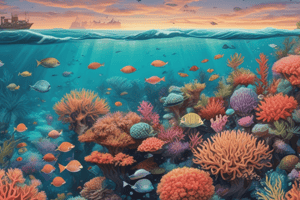Podcast
Questions and Answers
What is the primary purpose of marine protected areas (MPAs) in the context of climate change?
What is the primary purpose of marine protected areas (MPAs) in the context of climate change?
- To enhance climate resilience (correct)
- To destabilize marine life
- To trap greenhouse gas emissions
- To cause ocean heating
What significant function do MPAs perform to mitigate the impacts of climate change?
What significant function do MPAs perform to mitigate the impacts of climate change?
- Increasing greenhouse gas emissions
- Causing shifts in ocean currents
- Storing blue carbon (correct)
- Altering community thermal tolerances
How does a continuation of business-as-usual emissions affect established MPAs?
How does a continuation of business-as-usual emissions affect established MPAs?
- Reduces sea surface temperatures
- Leads to further destabilization (correct)
- Increases their sustainability
- Enhances community thermal tolerances
What challenges do marine protected areas face in ensuring their sustainability?
What challenges do marine protected areas face in ensuring their sustainability?
Which factor threatens the stability of established marine protected areas according to the text?
Which factor threatens the stability of established marine protected areas according to the text?
What do marine protected areas provide refuge to, while also combating climate change?
What do marine protected areas provide refuge to, while also combating climate change?
Study Notes
Confronting Climate Change Through Marine Conservation
Climate change poses a daunting challenge for the health and longevity of our oceans, which serve as a driving force behind weather patterns, food webs, and economic prosperity. This complex crisis encompasses various aspects, including the greenhouse gas emission trap causing ocean heating, shifts in currents, and devastating consequences for marine life and coastal communities.
The principal defense mechanism against climate change lies in preserving marine protected areas (MPAs), which offer refuge to marine creatures while simultaneously enhancing climate resilience across ecosystems. MPAs actively mitigate damages caused by climate change by storing significant amounts of organic matter—known as "blue carbon"—within their bounds.
However, although MPAs undeniably strengthen marine resistance to climate change, their sustainability faces several hurdles. According to a report published in Nature Climate Change (April 2018), a continuation of business-as-usual emissions leads to further destabilization of established MPAs due to increased average sea surface temperatures and altered community thermal tolerances. This implies that while MPAs remain essential tools in combatting climate change, they require continuous care and attention within evolving environmental contexts.
Moreover, research indicates that MPAs that are well-maintained and fully or highly protected exhibit substantial carbon sequestration capabilities alongside numerous beneficial outcomes like enhanced biodiversity and coastal protection. But maintaining and expanding MPAs necessitates collaboration amongst governments, policymakers, researchers, and nonprofit organizations.
In summary, marine conservation represents a crucial battleground in humanity's war against climate change. By establishing and managing MPAs, we can protect blue carbon reservoirs and ensure marine life adapts more readily to climate pressures. To accomplish this monumental task, collective engagement and innovation are needed, addressing biological, physical, and socioeconomic factors.
Studying That Suits You
Use AI to generate personalized quizzes and flashcards to suit your learning preferences.
Description
Test your knowledge on the intersection of climate change and marine conservation, exploring topics such as greenhouse gas emissions, marine protected areas, blue carbon storage, and the impact of climate change on marine life and coastal communities.




